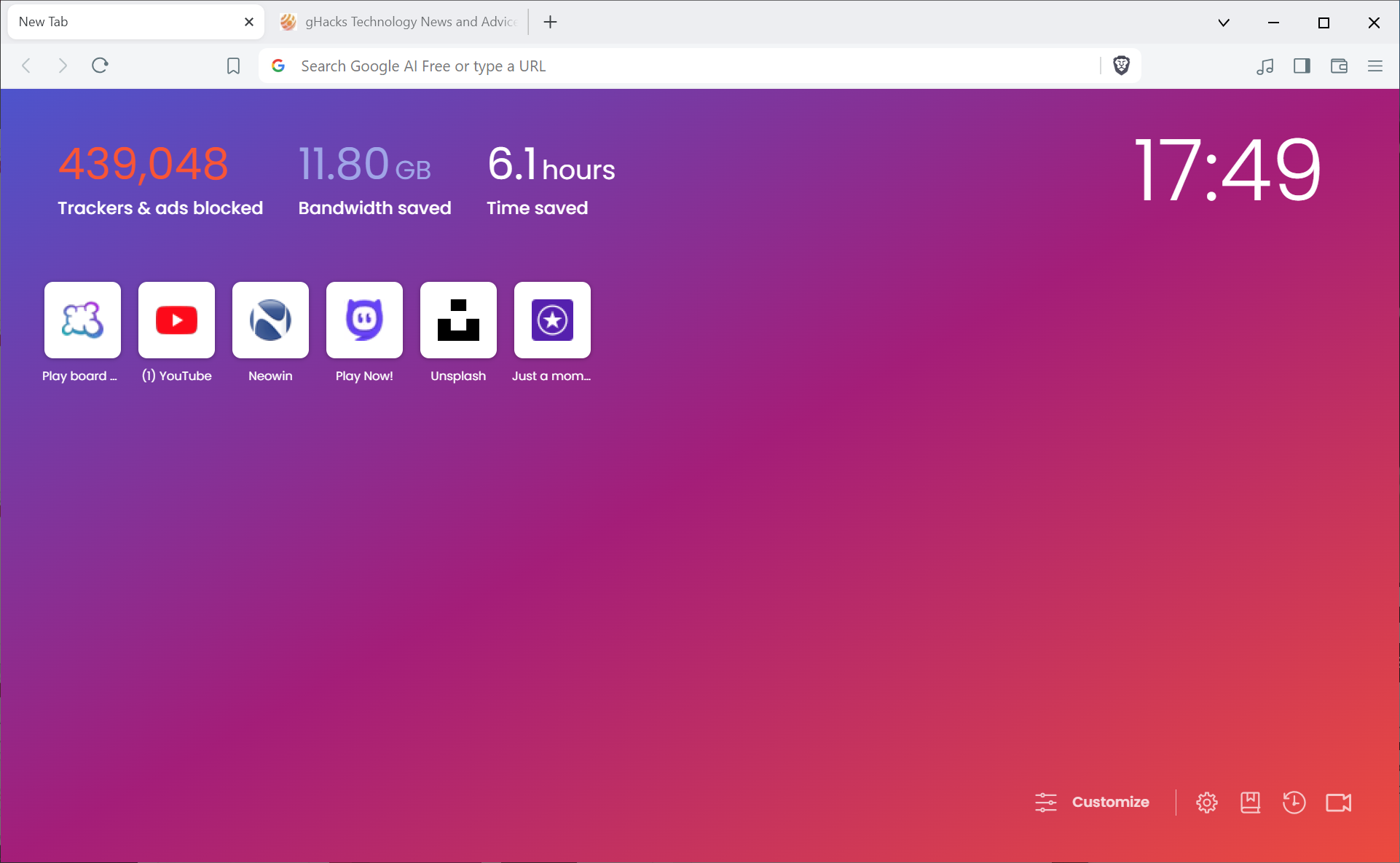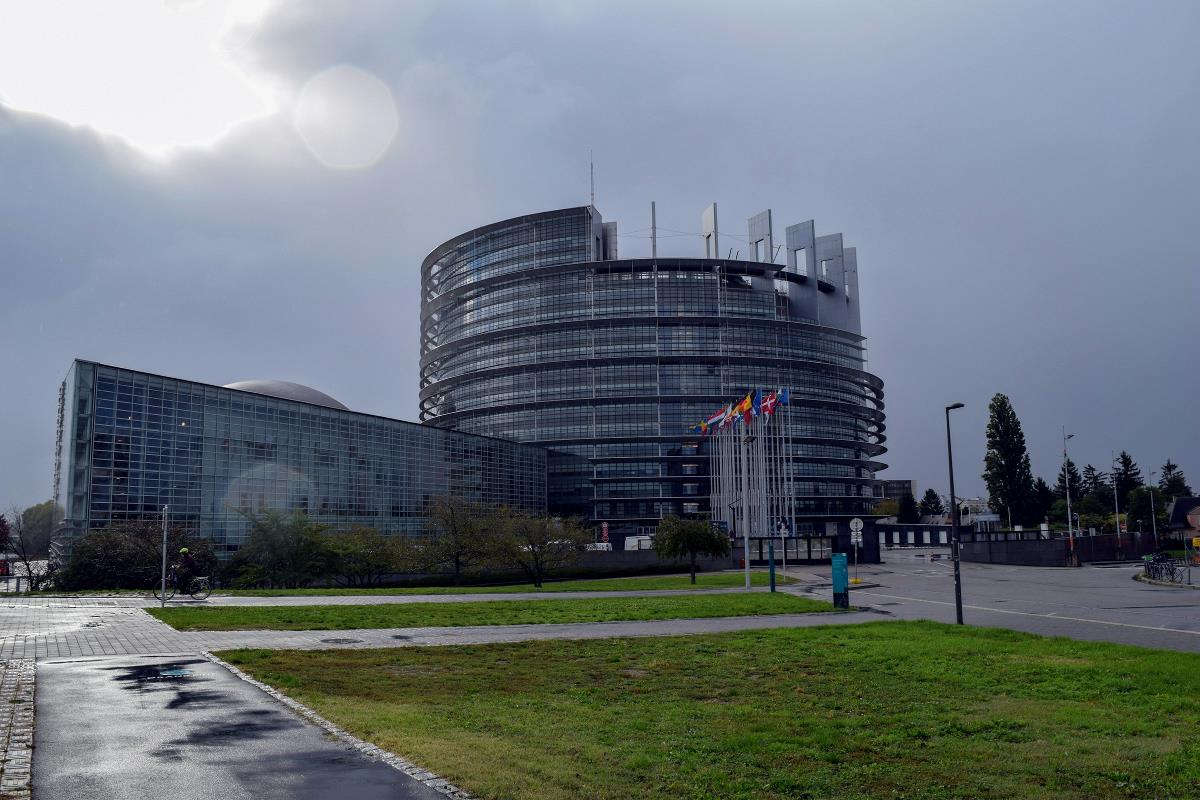Brave Browser won't support Google's Web Environment Integrity API

Last week, Google engineers published information about a new API, called Web Environment Integrity API, which it considered integrating into Chromium and of course Google Chrome. Despite claims that the API was just a proposal at the time, some part of it already landed in Chromium.
Broken down to its core, websites and services may use the API to find out if a client is trusted. Trust is determined by an attester, an authoritative party. In other words: an illustrious circle of attesters may soon control whether a user's operating system, web browser or other application that is used is trustworthy.
You can check out Ashwin's guide on Web Environment Integrity API for additional details.
Several web developers and companies have criticized Google's proposal already. Vivaldi engineer Julien Picalausa calls the API dangerous because if gives the deciding entities power and control. Users who run new browsers, browsers that are not trusted by the entities or legacy software might see themselves blocked from accessing sites and services on the Internet. Linux users might be on the receiving end, as might users who run adblockers.
Broken down to its core, critics believe that Google is trying to implement a DRM-like technology for the Web that is giving it, and a few companies that it needs, a lot of control over the future web.
Brave Software CEO Brendan Eich announced on Twitter that Brave Browser won't ship with the Web Environment Integrity API. He wrote: "We are a fork, have been all along, the “reskinned” claim is complete nonsense. We won’t be shipping WEI support, just as we disable or otherwise nullify lots of other junk that Google puts into Chromium".
Both Vivaldi and Brave use Chromium as the source for the browser, but both browsers have some features turned off and custom code added.
Mozilla Firefox engineer Brian Grinstead confirmed on GitHub that Mozilla is opposing the proposal "contradicts our principles and vision for the Web".
Closing Words
It is important that companies and software developers speak out openly against Google's proposal and intent to ship the Web Environment Integrity API. Granted, the three mentioned browsers are not in a position to change Google's stance on the matter, at least when it comes to market share. The situation might be different if Apple or Microsoft objected to the proposal, or if major Internet services would oppose it right away.
Now You: what is your take on the API?


















“Mozilla Firefox engineer Brian Grinstead confirmed on GitHub that Mozilla is opposing the proposal “contradicts our principles and vision for the Web””
Mozilla is downplaying the problem with WEI if they think it’s not evil enough for them to implement.
In the business field, the concept of “ABC analysis” is famous, but it is the rule that “the effective control of the market is not determined by the Majority, but by the presence of only 10 to 15% of the very powerful minority”.
Even if user-base is 80%, they can’t control the market.
At least, as long as there are “Forces that resolutely oppose”, the market will not become one-sided.
Significantly, Vivaldi, Brave, and Firefox “early expressed opposition”.
Furthermore, the arrival of Arc Browser (written in Swift instead of C++, supports adblockers, promises to protect user privacy, Clarify your confrontational stance with Google) is also not to be ignored.
Arc Resources: Everything you need to know about Arc
https://resources.arc.net/en/
Arc Privacy Policy | thebrowser.company
https://thebrowser.company/privacy/
FLoC (Federated Learning of Cohorts) and “Topics” failed.
Either way, end-user behavior will be the key.
it doesn’t matter what Brave, and Firefox does. They are irrelevant. Google, Apple and Microsoft call the shots on this.
In the end of the day it’s just Google trying to kill adblocks, ManifestV3+InterAPI, that screams the dead of adblocks.
Google Chrome should fucking dies.
You should not based your articles on tweets or any social media nothing.
You need to do it through Github information, Brave is open source, so use that.
Brendan Eich can be CEO and Founder of Brave, but it doesn’t mean he works in the Brave Browser, that’s why he hired people to do the job.
For now, the only sign of WEI is a trial that hasn’t even started, it is disabled by default. Brave pushed a PR to disable WEI from ever being turned on by default and that’s it.
For now, Brave is going to see how WEI progress and take a decision later with the Privacy VP, to see what will happen next.
So the whole “won’t support” is not known yet, especially if this gets added and websites start adding it to their websites. Just like Widevine, then browsers will be forced to add support.
I don’t even think this will be added to Chromium, and all the drama will be just drama, there has been more problematic APIs being added to Chromium which can get abused by bad developers to push bad stuff.
So this won’t be the only ‘drama’ in Chromium, so many trials never get integrated in Chromium either, so this might be just one that will die because if only Chrome supports it, then, websites are going to lose.
So it can go either way.
Anyway, all I wanted to say is for now Brave just disabled any possible WEI trial being turned on by default, Brave doesn’t need to do anything else, technically, just disabling is enough for now.
Yikes! Scary but realistic picture in this article.
I’m glad Brave, and Mozilla, rejects this extremely poor behavior from goo. Goo has a habit of destroying whatever it touches (think NNTP and a bazillion other technologies).
One would think that goo would close their known security hole that’s been around for over a decade now instead of thinking only of their pocketbook and how to monopolize the web.
As a developer, a professional, and personally I am also against WEI ever being implemented.
Thanks for this update Martin.
They’ll be forced to support it when Netflix and Disney and Google and your banks and video game services and news websites all adopt it.
On that note, people who give money to the above entities, especially the first three, are the reason the Internet is in the process of being ruined now.
Brave have expanded further on Brendan’s comment on their Mastodon account:
https://mastodon.social/@brave/110810761839512709
“Google, through its new Web Environment Integrity (WEI) proposal, wants to fight fraud and other issues by restricting website access to users running authorized browsers and platforms. This proposal will limit user choice and hurt the open Web. We won’t support it in Brave.
WEI is the latest Google effort to take control from users. Google’s First Party Sets feature helps sites track; its WebBundles proposal makes it harder for you to block or filter out unwanted page content. Google is pushing the Web in a terrible direction.
Web users deserve a browser that doesn’t treat them as enemies. Though Brave uses Chromium, we remove or disable Chromium features that harm users’ privacy or convenience. You can find a running list of these changes here:
https://github.com/brave/brave-browser/wiki/Deviations-from-Chromium-(features-we-disable-or-remove) “
No one should support that nonsense.
The Web Environment Integrity API needs to disappear.
Seeing the same three browsers (Brave, Firefox and Vivaldi) continuously taking a stand against hostile and anti-consumer features, is a good indication that those are the browsers people should be using.
+1